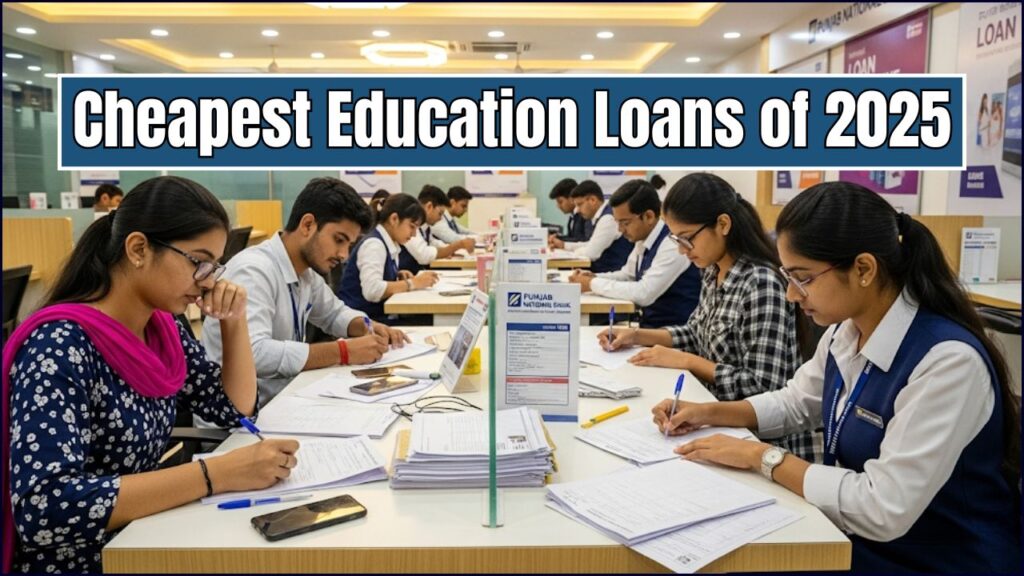
Students planning higher studies in India and abroad are watching closely as several Indian banks announce reductions in education loan rates. The cheapest education loans of 2025 are being offered by both public and private sector lenders, with some government-supported schemes lowering costs even further to improve access to higher education.
Key Banks Offering the Cheapest Education Loans
State Bank of India (SBI) Scholar Loan
The State Bank of India (SBI) continues to dominate the sector with its Scholar Loan Scheme. Interest rates range between 7.15 and 7.90 percent, applicable to students admitted to premier institutions. According to SBI’s official rate sheet, this represents one of the lowest rates available in the market for eligible applicants.
Bank of Maharashtra
The Bank of Maharashtra offers an education loan rate of 7.60 percent for loans up to ₹20 lakh. Independent analysts note that this remains among the most competitive products for students pursuing professional courses within India.
Canara Bank and Union Bank of India
Canara Bank provides floating rates starting at 8.75 percent and fixed rates reaching 11.60 percent, making it a mid-tier option. Meanwhile, Union Bank of India has positioned itself with rates beginning at 8.75 percent, available for loans of up to ₹1.5 crore, according to data compiled by Nomad Credit.
Bank of India – Star Vidya Loan
The Bank of India’s Star Vidya product has received attention for its rate of 8.25 percent for select institutions. The scheme, according to a GradRight survey, targets meritorious students from reputed colleges.
Government-Backed and State-Level Support
Gujarat’s GUEEDC Scheme
The Gujarat Unreserved Educational and Economical Development Corporation (GUEEDC) provides education loans at a subsidised 4 percent simple interest rate. Students eligible under this programme can borrow up to ₹15 lakh for overseas studies.
PNB under PM Vidyalaxmi Scheme
The Punjab National Bank (PNB) recently cut its education loan rates under the Pradhan Mantri Vidyalaxmi Scheme by 20 basis points. PNB stated in a release that the revision reflects the government’s directive to make education financing more affordable for middle-class families.
Why Interest Rates Are Falling in 2025
Financial analysts attribute the trend to a combination of monetary easing by the Reserve Bank of India (RBI) and growing competition among public sector banks. “Education loans are becoming a key market where banks seek long-term customer relationships,” said Ramesh Gupta, a senior economist at Delhi School of Economics.
Industry experts also highlight the rising demand for overseas education. According to the Ministry of Education, more than 1.2 million Indian students are expected to enrol abroad in 2025, making financing solutions critical to families.
What Borrowers Should Consider
Experts caution students to look beyond headline rates. Processing fees, moratorium periods, and repayment structures often vary. For example, SBI waives processing fees for smaller loans, while PNB offers special concessions for women borrowers.
Dr. Anjali Mehta, a financial literacy consultant, explained, “While interest rates are crucial, repayment flexibility and hidden charges can significantly affect the overall cost of education loans.”
Borrowers are also encouraged to review government subsidies. Under the Central Scheme of Interest Subsidy (CSIS), the Ministry of Education pays interest on loans taken by economically weaker sections during the moratorium period.
Arogya Saving Account Launched: Special Health + Money Benefits You Must Know Today
Outlook for Students and Families
The downward movement in rates offers relief for families struggling with rising education costs, both in India and overseas. However, financial planners warn that banks may revise rates upward if inflationary pressures return later in 2025.
For now, the cheapest education loans of 2025 provide Indian students with more affordable opportunities to pursue higher studies, but experts stress the importance of careful comparison before committing to a lender.





